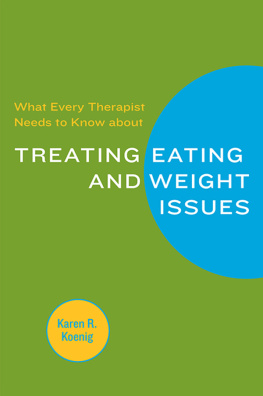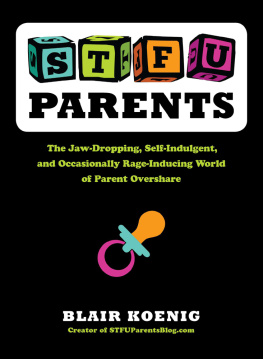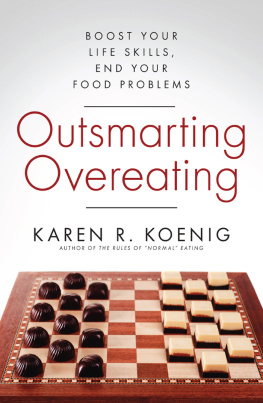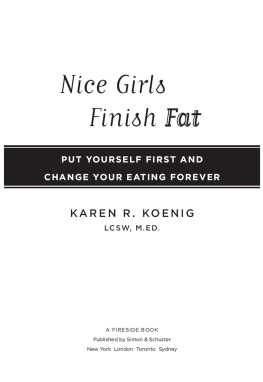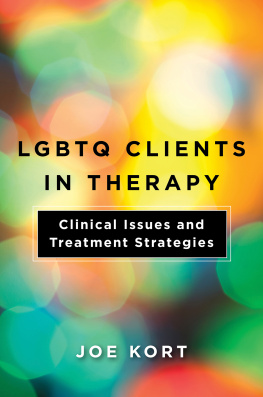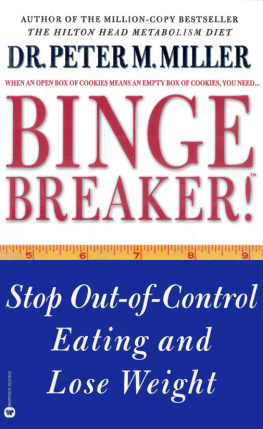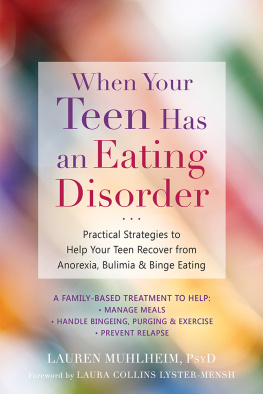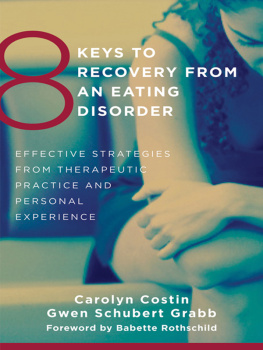Karen R. Koenig
Every year there are copious books written for the general public about dieting and weight loss. Usually there are also a number of books devoted to educating therapists on the treatment of conditions such as anorexia and bulimia nervosa. Many are geared to the clinician who is already treating clients with these serious conditions and who specializes in eating disorders.
But what about the generalist who treats a wide range of complaints and rarely (if ever) has a client with anorexia or bulimia? What of the clinician whose clients occasionally gripe about their weight or hint at over- or undereating without flagging these issues as a major concern? What of the practitioner who needs help recognizing clients concerns about food as they arise throughout the stages of life? What about the therapist who recognizes that her client is struggling with serious eating and weight issues, but does not know how to approach or treat them?
This book is written to help practitioners who do not specialize in eating disorders recognize and treat the major and minor food and weight problems they encounter in their practice. By major, I mean those problems that have plagued a client throughout life and substantially affect functioningsociability, interpersonal relationships, self-esteem, fitness, health, and the ability to create a happy and meaningful life. Major problems include a lifetime of food restriction or binge eating, maintaining a weight that is dangerously high or low, frequently yo-yoing between extreme weights, suffering from malnutrition, or believing that one is not thin enough when the mirror tells a different story. Minor problems are those that are transitory and less serious, such as minimal weight gain after pregnancy, adjusting to hormonal changes that show up on the scale, weight gain or loss due to medication, carrying around 5 to 10 extra pounds that simply will not come off and stay off, or ignorance about proper nutrition that can be resolved through education.
This book is based on the assumption that over the course of a career, the average practitioner may have taken a college elective course or a couple of professional development workshops on eating disorders, and may even have read journal articles or a book on the subject. However, it assumes that the clinician does not consider herself an expert, may be uncomfortable assessing and treating eating and weight problems, or may simply be ignorant about how concerns about food and body size play out in life and weave their way through psychotherapy.
It is highly likely that therapists will come across clients that struggle with food or weight at some point; according to the Web site of the Multi-service Eating Disorder Association, Inc. (MEDA), 66% of adult Americans are considered overweight or obese, 50% of women define themselves as overweight (even when they are not!), 80% of adults have dieted during their lifetime, and 60 million Americans are trying to lose weight (General Eating Disorder Fact Sheet, MEDA Web site). Although clients may turn up on our doorstep worried about depression, frightened by escalating marital conflict, feeling overwhelmed, or wanting a new career, many of them will have subclinical food problems that need to be addressed. Even highly skilled clinicians, of course, are not expected to know every client issue right off the bat, and food problems might not be on our radar. However, given the numbers above, it pays to keep an open mind and expect that some clients will bring us their struggles with eating and weight, along with their other problems.
My interest in this field is both professional and personal. As a therapist and educator, I have been working with people who have food issues for 30 years and have authored numerous articles on eating and body image dysfunction for clinicians and the general public. I have written two books The Rules of Normal Eating: A Commonsense Approach for Dieters, Overeaters, Undereaters, Emotional Eaters, and Everyone in Between! and The Food and Feelings Workbook: A Full Course Meal on Emotional Health. From the start of my career, my mission has been to teach people with eating problems how to eat normallythat is, to provide them with the skills that normal eaters use instinctively and automatically every day to take pleasure in food and maintain a comfortable weight for life.
Toward this end, I have taught Quit Fighting with Food workshops in the communities in which I have worked, and trained colleagues in professional development programs in the cognitive-behavioral treatment (CBT) model I use and favor. I have lectured to social workers, psychologists, registered dieticians, fitness instructors, medical students, and other professionals in the health and mental health fields. More and more, my experience has led me to recognize that most peopleand that includes seasoned cliniciansdo not understand the complicated and multifaceted root causes of food and weight problems and therefore have difficulty addressing them with clients.
On a personal level, I began struggling with food in my teens and continued through my early 30salternating between dieting and overeatinguntil I discovered the concept of intuitive eating. With both curiosity and trepidation, I began to read about disordered (often called dysfunctional) eating, gradually stopped dieting, and eventually gave up bingeing as well. I entered therapy with a general therapist who, fortunately, was able to help me overcome my food abuse problems. After my own success, I worked in a Massachusetts-based program teaching people how to make peace with food.
This book came about after Deborah Malmud, director of the Professional Books Division of W. W. Norton and Company, Inc., read an article I wrote for Social Work Today on what I call the rules of normal eating and my therapeutic approach. She wondered if I might be interested in writing a book for therapists on the subject, and I jumped at the chance. More than my two previous books, What Every Therapist Needs to Know about Treating Eating and Weight Issues pulls together all my experienceas a disordered eater, client in treatment, and therapistto help practitioners treat two of the major issues of our time, eating and weight.
There was once a time when the solution to excess weight was singular and simple: just go on a diet, we were told. Take in fewer calories and watch the pounds slip away. This recourse developed from the long-held view that overeating is a moral issueconsume in moderation, exert some self-control, and all will be well.
As science began to understand and explain that being overweight was far more of a physical problem than a moral failure, we learned that, along with ingesting fewer calories, we needed to expend more energy to burn them off. Before long, however, another factor emerged in the equation. We discovered that it mattered not only how much we ate, but what and whensmall, frequent meals accelerated calorie burn-off, carbohydrates and proteins each affected appetite differently, and metabolism was more complex than anyone could have imagined.
Further studies went on to conclude that all appetites are not created equal and that hormones, heredity, and biochemistry play a far greater role in eating and weight regulation than we previously thought. We learned that specific foods alter our biochemistry and moods and that genetics may largely predetermine weight and body structure. We found out that appetite hormones and neurotransmitters were a major determinant of whether we could easily control our appetite and lose weight (not to mention regulate emotions!), and that medication and surgery could be utilized to reach our weight and eating goals.

